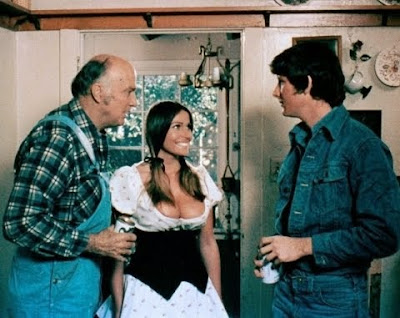Looper
If you want to give your mind some calisthenics, ponder, really ponder the notion of time travel. Putting aside all the tedious mathematics, mull over every inconsistency, every loophole to which logic will lead. The subject has been explored in literature and film countless times, focusing often on emotional matters like hearing you long deceased grandmother's voice on the phone, reliving a first kiss, or making sure your teenage parents meet and fall in love - so you can actually be born, of course. In the case of the latter, so entertainingly played in BACK TO THE FUTURE, what if Marty had failed? He nearly does, and in one scene begins to lose his gait, even looking through his own hand as it goes transparent, as he begins to evaporate and cease to exist.
That intrigues me. Mainly in terms of memories. What if one of my friends goes back in time and does something to change the course of history, mine included. All of those memories I have, my current life, would just vanish? Where in the timeline does cognizance shift to nothingness? Or to differing awareness? It's maddening to think on, and certainly has been fodder for mankind to argue over, especially after viewing movies like last year's LOOPER, director Rian Johnson's entry in the genre. It is a far darker, edgier take on time travel than the (mostly) lighthearted FUTURE trilogy, and this new film brazenly refutes one of old Doc Brown's theories: if your older and younger self meet face to face, you'll both faint and maybe the space time continuum will implode, or, something like that.
2044. A large criminal organization utilizes "loopers" who kill syndicate enemies in the traditional ways, with a twist: knowing when their targets are to materialize (the victims are sent back in time to appear at a particular spot) the loopers are ready with a shotgun to take down the hooded individual and, for their services, retrieve a belt of silver plates fitted around the soon-to-be corpse. Engineering this: a man sent from the future called Abe (Jeff Daniels) who ensures that the loops are closed by forcing aged loopers about to retire back in time to be killed by their younger selves. Brutal, but efficient.
Joe (Joseph Gordon-Levitt) is the central figure in LOOPER. He's solemn and glum, much like his colleagues, though in such a bleak landscape (with an ultimately hopeless outcome ahead of you) can you blame them? One day, a fellow looper screws up and fails to kill his older self. But soon, Joe makes the same mistake. Johnson's script will then traverse familiar territory in these sorts of stories. For example, the complications of an alternate timeline, which I will not elaborate upon. But I will recount that, as you can see from the above still, Joe will eventually stare down and converse with his older self, played with appropriate weariness by Bruce Willis. Neither one faints because of it.
Later, young Joe will camp out at the farm of a young woman named Sarah (Emily Blunt, sporting a decent American accent) and her son. Again, I won't spill too many details because convoluted tales like this often live in their labyrinthine plot twists. I will say that the Realist in me was duking it out with the Suspender of Disbelief all the while. For some, fantasies like LOOPER prove too unbelievable, the inevitable fountain of questions distracting. Not this guy. Part of the amusement comes from picking holes, saying "Waitaminit!" Johnson does have a bit of fun with time travel conventions, but then leads his story to a dour final act. Very odd, as the film becomes both a bit too cuddly, almost resembling a family drama, while meanwhile maintaining a tone of doom (and showcasing a few moments of showstopping violence). The climax manages to be hopeful and downbeat in one quick shot.



Comments